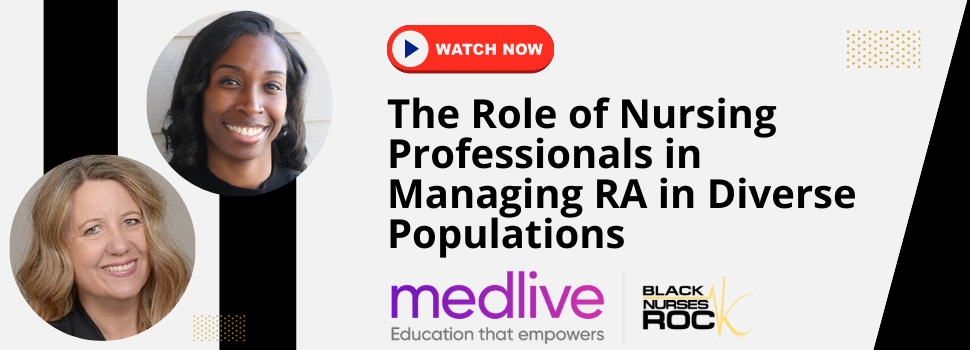The Role of Nursing Professionals
in Managing RA in Diverse Populations
Race, ethnicity, and gender can impact Rheumatoid Arthritis (RA) risk, disease activity, and treatment response. Nurses and advanced practitioners play a key role in delivering equitable, high-quality care. Join RA experts Stephanie Spaulding, MSN, FNP-BC, and Kori Dewing, DNP, ARNP, ANP-BC, RN-BC, as they explore disparities in RA outcomes and share strategies for improving care across diverse populations.
Featured Faculty:
Stephanie Spaulding, MSN, FNP-BC
Family Nurse Practitioner
Division of Rheumatology
Department of Medicine
Duke University Medical Center
Kori Dewing, DNP, ARNP, ANP-BC, RN-BC
Teaching Associate University of Washington, Department of Medicine, Division of Rheumatology
Faculty, University of Washington, School of Nursing, Department of Biobehavioral and Health Systems
ANCC Board Certified Adult Nurse Practitioner
ANCC Board Certified Rheumatology Nurse
Registration Link:
Program Description:
Community practitioners who treat patients with rheumatoid arthritis (RA) must be cognizant of demographic factors, including race/ethnicity and gender, that affect the risk of developing RA and influence disease activity and treatment response. Fortunately, nurses and advanced practitioners are uniquely positioned to provide equitable and high-quality care to patients with RA from diverse backgrounds. Join RA experts Stephanie Spaulding, MSN, FNP-BC, and Kori Dewing, DNP, ARNP, ANP-BC, RN-BC, to discuss the impacts of gender and race/ethnicity on RA outcomes, the rationales for increased involvement of nurses and advanced practitioners in RA care, and strategies to ensure equitable and effective treatment in diverse populations.
Learning Objectives:
- Discus the role of nurses and advanced practitioners to enhance patient access to multidisciplinary, wholistic RA care for people of color and those from rural or “care desert” areas
- Summarize updated recommendations from ACR and EULAR for RA diagnosis and treatment with csDMARD, bDMARD, and tsDMARD
- Summarize strategies that nurses and advanced practitioners can employ to educate patients on the importance of reaching remission
Topics of Interest:
- Barriers to optimal RA care in people of color and from under-resourced communities
- Roles of nurses and advanced practice providers in RA care
- Coordinating multidisciplinary care
- ACR treatment guidelines
- Reaching treatment goals: when to escalate therapy, managing flare ups, managing pain
- Integrative interventions for RA
- Gaining culturally competent skills
- Monitoring safety and adherence
Full CE Information:
The Role of Nursing Professionals in Managing RA in Diverse Populations
This activity is jointly provided by Global Education Group (Global) and PlatformQ Health Education, LLC (PQHE), in collaboration with Black Nurses Rock (BNR).
ACKNOWLEDGEMENT
This activity is supported by an independent educational grant from AbbVie Inc.
DATE OF RELEASE/EXPIRATION
This activity was released on April 9, 2025 and is valid until April 9, 2026. Requests for credit must be made no later than April 9, 2026.
TARGET AUDIENCE
The educational design of this activity addresses the needs of rheumatology nursing professionals and other allied healthcare professionals.
STATEMENT OF NEED/PROGRAM OVERVIEW
Community practitioners who treat patients with rheumatoid arthritis (RA) must be cognizant of demographic factors, including race/ethnicity and gender, that affect the risk of developing RA and influence disease activity and treatment response. Fortunately, nurses and advanced practitioners are uniquely positioned to provide equitable and high-quality care to patients with RA from diverse backgrounds. Join RA experts Stephanie Spaulding, MSN, FNP-BC, and Kori Dewing, DNP, ARNP, ANP-BC, RN-BC, to discuss the impacts of gender and race/ethnicity on RA outcomes, the rationales for increased involvement of nurses and advanced practitioners in RA care, and strategies to ensure equitable and effective treatment in diverse populations.
EDUCATIONAL OBJECTIVES
After completing this activity, the participant should be better able to:
- Discus the role of nurses and advanced practitioners to enhance patient access to multidisciplinary, wholistic RA care for people of color and those from rural or “care desert” areas
- Summarize updated recommendations from ACR and EULAR for RA diagnosis and treatment with csDMARD, bDMARD, and tsDMARD
- Summarize strategies that nurses and advanced practitioners can employ to educate patients on the importance of reaching remission
JOINT ACCREDITATION STATEMENT
In support of improving patient care, this activity has been planned and implemented by Partners for Advancing Clinical Education (PACE) and PlatformQ Health Education, LLC. PACE is jointly accredited by the Accreditation Council for Continuing Medical Education (ACCME), the Accreditation Council for Pharmacy Education (ACPE), and the American Nurses Credentialing Center (ANCC), to provide continuing education for the healthcare team.
NURSING CONTINUING EDUCATION
Global Education Group is accredited as a provider of nursing continuing professional development by the American Nurses Credentialing Center’s Commission on Accreditation.
This educational activity for 0.75 contact hours including 0 pharmacotherapeutic contact hours is provided by Global Education Group. Nurses should claim only the credit commensurate with the extent of their participation in the activity.
NURSE PRACTITONER CONTINUING EDUCATION

This activity has been planned and implemented in accordance with the Accreditation Standards of the American Association of Nurse Practitioners (AANP) through the joint providership of Global Education Group and PlatformQ. Global Education Group is accredited by the American Association of Nurse Practitioners as an approved provider of nurse practitioner continuing education. Provider number: 110121. This activity is approved for 0.75 contact hour(s) (which includes 0 hour(s) of pharmacology).
ESTIMATED TIME TO COMPLETE
This activity should take approximately 45 minutes to complete.
INSTRUCTIONS TO RECEIVE CREDIT
In order to receive credit for this activity, the participant must (1) read the target audience, learning objectives, and disclosure statements, (2) complete the educational activity online, and (3) complete the post-test and activity evaluation. To receive credit participants must receive a score of 70% on the post-test.
HARDWARE/SOFTWARE REQUIREMENTS
Participants will need a computer with a recent version of Adobe Flash installed, as well as an internet connection sufficient for streaming media.
FEE INFORMATION & REFUND/CANCELLATION POLICY
There is no fee for this educational activity.
Disclosures of Relevant Financial Relationships
Global Education Group (Global) adheres to the policies and guidelines, including the Standards for Integrity and Independence in Accredited CE, set forth to providers by the Accreditation Council for Continuing Medical Education (ACCME) and all other professional organizations, as applicable, stating those activities where continuing education credits are awarded must be balanced, independent, objective, and scientifically rigorous. All persons in a position to control the content of an accredited continuing education program provided by Global are required to disclose all financial relationships with any ineligible company within the past 24 months to Global. All financial relationships reported are identified as relevant and mitigated by Global in accordance with the Standards for Integrity and Independence in Accredited CE in advance of delivery of the activity to learners. The content of this activity was vetted by Global to assure objectivity and that the activity is free of commercial bias.
All relevant financial relationships have been mitigated.
The faculty have the following relevant financial relationships with ineligible companies:
| Name of Faculty or Presenter | Reported Financial Relationship |
| Stephanie Spaulding, MSN, FNP-BC
Family Nurse Practitioner Division of Rheumatology Department of Medicine Duke University Medical Center
|
Nothing to disclose. |
| Kori Dewing, DNP, ARNP, ANP-BC, RN-BC
Teaching Associate University of Washington, Department of Medicine, Division of Rheumatology Faculty, University of Washington, School of Nursing, Department of Biobehavioral and Health Systems ANCC Board Certified Adult Nurse Practitioner ANCC Board Certified Rheumatology Nurse
|
Nothing to disclose. |
| Vibeke Strand, MD, FACP, MACR
(Course Director) Adjunct Clinical Professor Division of Immunology/Rheumatology
|
Consulting Fee (e.g., Advisory Board): Abbvie, Alpine Immune Sciences, Alumis, Amgen, AstraZeneca, Atom Biosciences, Bayer, Blackrock, BMS, Boehringer Ingelheim, Celltrion, Contura, Fate Therapeutics, Fortress Biotech, Gate Biosciences, Genascence, GSK, Ichnos, Inmedix, Janssen, Kiniksa, Lipum, Monte Rosa, Novartis, Omeros, Ono, Pfizer, R-Pharm, RAPT, Samsung, Sandoz, Sanofi, Scipher, Zoe |
The planners and managers at Global Education Group and PlatformQ Health Education, LLC have no relevant financial relationships to disclose.
DISCLOSURE OF UNLABELED USE
This educational activity may contain discussion of published and/or investigational uses of agents that are not indicated by the FDA. Global Education Group (Global) and PlatformQ Health Education, LLC do not recommend the use of any agent outside of the labeled indications.
The opinions expressed in the educational activity are those of the faculty and do not necessarily represent the views of any organization associated with this activity. Please refer to the official prescribing information for each product for discussion of approved indications, contraindications, and warnings.
DISCLAIMER
Participants have an implied responsibility to use the newly acquired information to enhance patient outcomes and their own professional development. The information presented in this activity is not meant to serve as a guideline for patient management. Any procedures, medications, or other courses of diagnosis or treatment discussed in this activity should not be used by clinicians without evaluation of patient conditions and possible contraindications on dangers in use, review of any applicable manufacturer’s product information, and comparison with recommendations of other authorities.
CONTACT INFORMATION
Accreditation Support:
For information about the accreditation of this program, please contact Global at 303-395-1782 or cme@globaleducationgroup.com.
Technical Support:
For any technical issues or issues with your CME Certificate, please contact Medlive at 877-394-1306 or at Support@Medlive.com.



